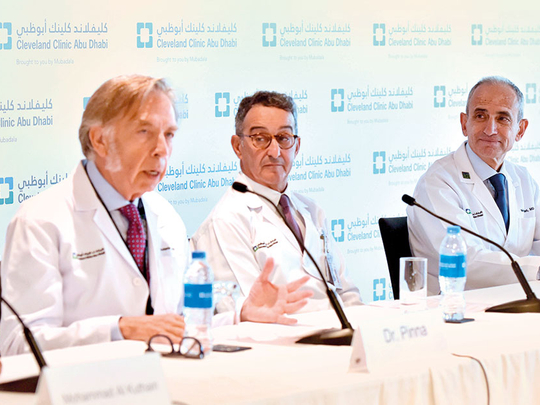
Abu Dhabi: Two pioneering surgeries in the capital this month have marked the UAE’s first full liver transplant and first lung transplant from deceased donors, doctors said on Tuesday.
The procedures have also cemented Cleveland Clinic Abu Dhabi’s status as the first multi-organ transplant facility in the country, with the hospital now having performed deceased donor transplants for four major solid organs – the kidneys, heart, liver and lungs.
The first full liver transplant in the UAE from a deceased donor was undertaken on February 1 to treat a 60-year-old Emirati man suffering from liver cirrhosis and failure. His condition was further complicated by fluid accumulation and infection in the abdomen coupled with gastrointestinal bleeding. Then, on February 11, a deceased donor provided a lung to a 53-year-old Emirati man afflicted by chronic obstructive pulmonary disease.
The first recipients of these four solid organs from deceased donors have all been Emirati patients.
“These surgeries mark a milestone for organ transplantation in the country, following the changes to organ transplantation law. Each procedure marks a life saved and a community impacted,” said Dr Rakesh Suri, chief executive officer at Cleveland Clinic Abu Dhabi.
Organ transplantation in UAE
Kidney transplants have been performed in Abu Dhabi since 2009. Organ donations from one family member to another were the primary method for these transplants, given differences in Islamic scholarly opinion about the permissibility of organ donation from deceased persons.
In recent years however, such opinion has come to favour organ donation from the deceased, and the UAE legalised donation from deceased donors in September 2016. The presidential decree came into effect in March 2017, to the relief of patients and medical professionals.
Dr Ali Al Obadli, chair of the UAE’s National Transplant Committee, stressed that the recent changes and milestones have opened up doors to better human health.
“One donor can save up to eight lives, or even more if we count tissue donations, and we are now working to finalise and announce details about a donor registry platform for the country. These details will be announced over the next month. As far as we see it, all UAE residents can register to donate organs, and the available organs will be available for any patient who needs it,” he told Gulf News.
Since the UAE does not yet have a national donor registry, the family can, at present, convey the wishes of the deceased to donate organs to a hospital. As reported by Gulf News in 2013, a survey by Abu Dhabi’s first transplant facility, Shaikh Khalifa Medical City, had found that more than 60 per cent of respondents were willing to donate organs.
“As it happens however, only one per cent of the general population, and 14 per cent of those who pass in the intensive care unit, can actually donate organs viable for transplantation,” Dr Al Obaidli added.
The official also said he expected the UAE’s organ transplantation to mirror international volumes.
“On average, there are about 130,000 solid organ transplants around the world each year. 70 per cent of these are kidney transplants, followed by transplants of the liver, the heart and then the lungs,” he said.
According to Dr Bashir Sankari, chief of surgical subspecialties at Cleveland Clinic Abu Dhabi, a country like the UAE with a population of eight million people can expect to see 400 candidates for kidney transplants a year.
“There are about 1,200 patients on dialysis at present in the UAE, and given the huge drain on financial resources this presents, about a third of these patients could soon be referred for transplants. On average each year, the UAE can also expect to see 40 liver transplants, 20 heart transplants and 12 lung transplants each year,” he explained.
Asked about insurance coverage for transplant procedures among expatriate patients, Dr Al Obaidli said he expected providers to keep pace with demand.
“We have not yet looked at insurance coverage closely. But in general, health insurance is designed to provide care to those who need it the most, and organ transplant patients obviously fall into this category,” he said.
UAE’s first deceased donor transplants
Kidneys: April 2013 at Shaikh Khalifa Medical City
Latifa Mohammad, a 23-year-old Emirati from Al Ain, received the first kidney in the UAE procured from a deceased donor. The patient had suffered from kidney failure since the age of seven. The donor was a 29-year-old victim of a road traffic accident in Saudi Arabia.
Cleveland Clinic Abu Dhabi performed its first transplant from a deceased donor in September 2017 when it treated a 40-year-old female Emirati with kidney failure.
Heart: December 5, 2017 at Cleveland Clinic Abu Dhabi
A 38-year-old Emirati man became the first person in the UAE to receive a transplanted heart from a deceased donor. The patient had been suffering from end-stage heart failure.
The kidneys of the deceased donor were also used to save two other people in Abu Dhabi who needed kidney transplants.
Liver: February 1, 2018 at Cleveland Clinic Abu Dhabi
The donor liver was retrieved from a hospital in Ajman, and the procedure took eight hours. Al Kuthairi is expected to be discharged soon.
The deceased donor in this case was also able to provide a kidney to another patient at the hospital, another kidney to a patient at Shaikh Khalifa Medical City, and other organs to patients in Saudi Arabia.
Lungs: February 11, 2018 at Cleveland Clinic Abu Dhabi
The first lung transplant in the UAE from a deceased donor was performed. The donor lung was retrieved from a hospital in Fujairah via air ambulance, and the recipient was a 53-year-old Emirati who had been suffering from chronic obstructive pulmonary disease. His right lung was transplanted in a minimally-invasive surgery that lasted about three and a half hours, and the patient is now in recovery at the hospital.












